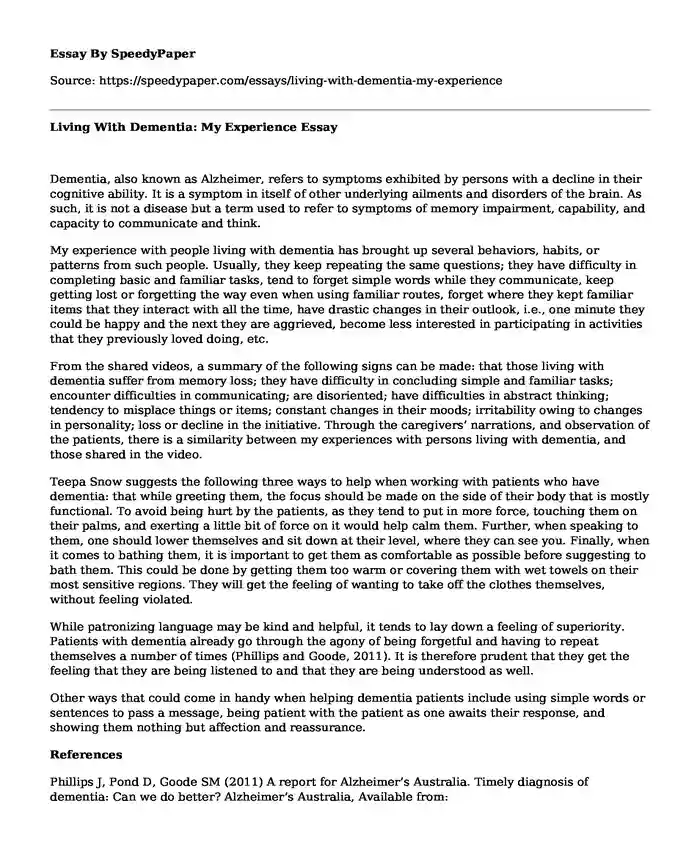
| Type of paper: | Essay |
| Categories: | Medicine Healthcare Disorder Dementia |
| Pages: | 2 |
| Wordcount: | 535 words |
Dementia, also known as Alzheimer, refers to symptoms exhibited by persons with a decline in their cognitive ability. It is a symptom in itself of other underlying ailments and disorders of the brain. As such, it is not a disease but a term used to refer to symptoms of memory impairment, capability, and capacity to communicate and think.
My experience with people living with dementia has brought up several behaviors, habits, or patterns from such people. Usually, they keep repeating the same questions; they have difficulty in completing basic and familiar tasks, tend to forget simple words while they communicate, keep getting lost or forgetting the way even when using familiar routes, forget where they kept familiar items that they interact with all the time, have drastic changes in their outlook, i.e., one minute they could be happy and the next they are aggrieved, become less interested in participating in activities that they previously loved doing, etc.
From the shared videos, a summary of the following signs can be made: that those living with dementia suffer from memory loss; they have difficulty in concluding simple and familiar tasks; encounter difficulties in communicating; are disoriented; have difficulties in abstract thinking; tendency to misplace things or items; constant changes in their moods; irritability owing to changes in personality; loss or decline in the initiative. Through the caregivers’ narrations, and observation of the patients, there is a similarity between my experiences with persons living with dementia, and those shared in the video.
Teepa Snow suggests the following three ways to help when working with patients who have dementia: that while greeting them, the focus should be made on the side of their body that is mostly functional. To avoid being hurt by the patients, as they tend to put in more force, touching them on their palms, and exerting a little bit of force on it would help calm them. Further, when speaking to them, one should lower themselves and sit down at their level, where they can see you. Finally, when it comes to bathing them, it is important to get them as comfortable as possible before suggesting to bath them. This could be done by getting them too warm or covering them with wet towels on their most sensitive regions. They will get the feeling of wanting to take off the clothes themselves, without feeling violated.
While patronizing language may be kind and helpful, it tends to lay down a feeling of superiority. Patients with dementia already go through the agony of being forgetful and having to repeat themselves a number of times (Phillips and Goode, 2011). It is therefore prudent that they get the feeling that they are being listened to and that they are being understood as well.
Other ways that could come in handy when helping dementia patients include using simple words or sentences to pass a message, being patient with the patient as one awaits their response, and showing them nothing but affection and reassurance.
References
Phillips J, Pond D, Goode SM (2011) A report for Alzheimer’s Australia. Timely diagnosis of dementia: Can we do better? Alzheimer’s Australia, Available from: https://www.fightdementia.org.au/files/Timely-Diagnosis-Can-we-do-better.pdf
Cite this page
Living With Dementia: My Experience. (2023, Oct 13). Retrieved from https://speedypaper.net/essays/living-with-dementia-my-experience
Request Removal
If you are the original author of this essay and no longer wish to have it published on the SpeedyPaper website, please click below to request its removal:
- Background on Migraine Headache - Free Essay
- Which term best describes your industry?
- Essay Sample about Health-Related Sustainable Development Goals
- Free Essay Example: Eating Disorders
- Essay Sample on Homeopathy: A Holistic Approach
- Paper Example: The Mortality Transition in Western Culture
- The Negative Implication of Ventilators in Terms of Lung Damage to COVID-19 Patients - Essay Sample
Popular categories




